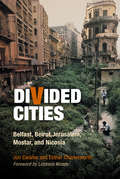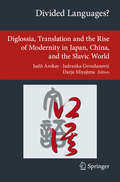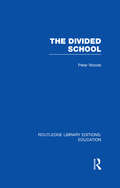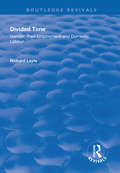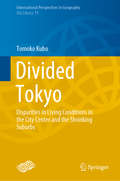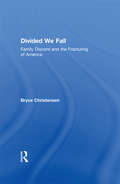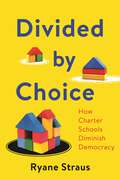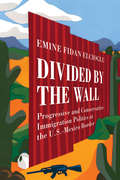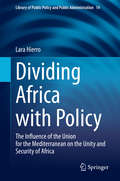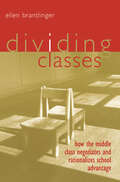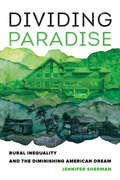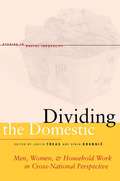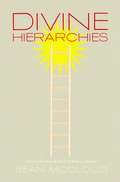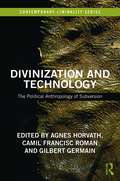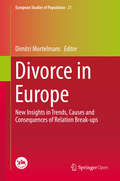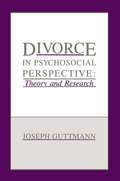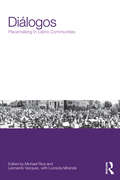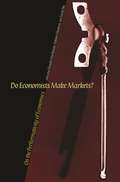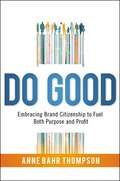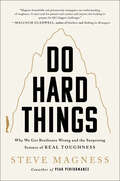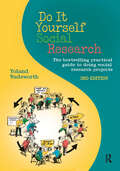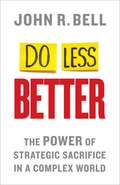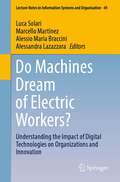- Table View
- List View
Divided Cities
by Jon Calame Esther Charlesworth Lebbeus WoodsIn Jerusalem, Israeli and Jordanian militias patrolled a fortified, impassable Green Line from 1948 until 1967. In Nicosia, two walls and a buffer zone have segregated Turkish and Greek Cypriots since 1963. In Belfast, "peaceline" barricades have separated working-class Catholics and Protestants since 1969. In Beirut, civil war from 1974 until 1990 turned a cosmopolitan city into a lethal patchwork of ethnic enclaves. In Mostar, the Croatian and Bosniak communities have occupied two autonomous sectors since 1993. These cities were not destined for partition by their social or political histories. They were partitioned by politicians, citizens, and engineers according to limited information, short-range plans, and often dubious motives. How did it happen? How can it be avoided?Divided Cities explores the logic of violent urban partition along ethnic lines--when it occurs, who supports it, what it costs, and why seemingly healthy cities succumb to it. Planning and conservation experts Jon Calame and Esther Charlesworth offer a warning beacon to a growing class of cities torn apart by ethnic rivals. Field-based investigations in Beirut, Belfast, Jerusalem, Mostar, and Nicosia are coupled with scholarly research to illuminate the history of urban dividing lines, the social impacts of physical partition, and the assorted professional responses to "self-imposed apartheid." Through interviews with people on both sides of a divide--residents, politicians, taxi drivers, built-environment professionals, cultural critics, and journalists--they compare the evolution of each urban partition along with its social impacts. The patterns that emerge support an assertion that division is a gradual, predictable, and avoidable occurrence that ultimately impedes intercommunal cooperation. With the voices of divided-city residents, updated partition maps, and previously unpublished photographs, Divided Cities illuminates the enormous costs of physical segregation.
Divided Languages?
by Judit Árokay Jadranka Gvozdanović Darja MiyajimaThe present volume is a collection of papers presented at the international conference "Linguistic Awareness and Dissolution of Diglossia" held in July 2011 at Heidelberg University. The aim is to reevaluate and compare the processes of dissolution of diglossia in East Asian and in European languages, especially in Japanese, Chinese and in Slavic languages in the framework of the asymmetries in the emergence of modern written languages. Specialists from China, Japan, Great Britain, Germany and the U. S. contributed to the volume by introducing their research focusing on aspects of the dissolution of diglossic situations and the role of translation in the process. The first group of texts focuses on the linguistic concept of diglossia and the different processes of its dissolution, while the second investigates the perception of linguistic varieties in historical and transcultural perspectives. The third and final group analyses the changing cultural role and function of translations and their effect on newly developing literary languages.
Divided School (Routledge Library Editions: Education)
by Peter WoodsIn this ethnographic study of a secondary school in the UK, the author presents an incisive account of school life from the various points of view of the pupils, teachers and parents. He describes and analyses major areas of experience and methods of adapting to school for both the children and their teachers; school experience is shown to be widely varying from boredom, despair and humiliation, to gaiety, exultation and comradeship some of it officially and some of it unofficially sponsored. The description reveals a number of marked and interpenetrating divisions within schools: between teachers and pupils, parents and teachers, parents and children and between pupils themselves. These divisions are explored, analysed and related both to institutional factors and to factors outside the school. The study suggests how these factors influence pupil and teacher strategies, and hence how the details of school life relates to wider society.
Divided Time: Gender, Paid Employment and Domestic Labour (Routledge Revivals)
by Richard LaytePublished in 1999. Housework and child care are a major part of most peoples lives. The growth of part time work amongst women is just one example of the way our economy is structured to accommodate this fact. Yet very little research has been done on this subject in Britain and what little has been done tends to be small scale and impressionistic. This book examines how couples divide their time between domestic and paid work and the effect that tensions between the two can have. It provides valuable evidence on how domestic work is organized and why, when women are more likely to be employed than not, men have not increased their share of domestic work. Representative evidence is combined with previous small scale research to show how private troubles are related to massive social and economic changes in British society. Evidence of this sort has never been presented before in the British context.
Divided Tokyo: Disparities in Living Conditions in the City Center and the Shrinking Suburbs (International Perspectives in Geography #11)
by Tomoko KuboThis book explores how and why Tokyo has been divided over time in terms of living conditions. First, recent urban discourses that explain the transformation of Tokyo’s urban structure are examined, along with social changes and the expansion of unequal residential conditions within the metropolitan area. Chapter 1 reviews: 1) discussions on globalization, neo-liberalization, and changes in housing policies; 2) debates on the divided city; 3) debates on the shrinking city and the urban lifecycle; 4) discussion of the urban residential environment from a social justice perspective; and 5) family–housing relationships in the post-growth society. Based on the literature review, the rest of the book is structured as follows. Chapter 2 explains the changes in urban and housing policies, demography, and socio-economic conditions. In Chapters 3 to 5, the background and characteristics of the growth of condominium living in the city center are examined. The next three chapters analyze the reality of shrinking suburbs, using case studies to demonstrate the increase in vacant housing and local responses toward shrinkage. In Chapter 9, possible solutions are proposed for dealing with problems related to urban shrinkage and the expanding gap in terms of the availability of investments to stimulate urban development, the residential environment, and the population age structure in Japanese cities by comparing the author’s findings and the literature review. This book provides deep insights for urban and housing scholars, urban planners, policy decision-makers, and local communities that struggle with aging populations and urban shrinkage.
Divided We Fall: Family Discord and the Fracturing of America
by Bryce ChristensenIn the weeks that followed the horror of September 11, politicians of both major parties resolutely asserted America's national unity. Barely four years later, the illusions of the rhetoric of unity have given way to the divisive oversimplifications of Red vs. Blue electoral cartography. Divided We Fall: Family Discord and the Fracturing of America offers a more nuanced yet more disturbing picture of American disunity, a disunity both social and political, both public and personal. Deeper than the disagreements that separate voter from voter, this disunity increasingly separates man from woman, husband from wife, parent from child, grandparent from grandchild, and sibling from sibling. Though the national turmoil in family life has unquestionably opened new divides in political life (on the questions of abortion and gay marriage, for instance), this analysis explores the bewildering cross-cutting tensions surrounding these fissures. The search for ways to bridge such fissures takes on particular urgency because of the mounting costs of family disintegration--social and legal, cultural and psychological. Because they recognize the often-desperate plight of single mothers and their children, policymakers have often worked together in bipartisan fashion to intensify government efforts to collect child support from non-custodial fathers, to place abused children in foster care, and to provide shelter for the family fragments on the street. But these pragmatic government responses to pressing social needs are no substitute for deeper probing into the cultural causes of these needs. Indeed, as the author probes those causes--including the erosion of the home economy, of restraints on sexual conduct, and of the traditional family wage--he warns that continued reliance on government to compensate for family failure will make matters worse in the long run. While family failure puts ever more burdens on government, this investigation shows how such failure withers the selfless civic impulses that sustain any healthy government.
Divided by Choice: How Charter Schools Diminish Democracy
by Ryane McAuliffe StrausHow race and capitalism shape educationSchool choice programs—such as vouchers, education savings accounts, and tax credit scholarships—are surrounded by controversy, raising questions about their impact on student diversity and inequality. In this book, Ryane McAuliffe Straus takes up a core part of this divisive debate, exploring why charter schools are reshaping America’s education system—and democracy—for the worse.Drawing on interviews with elected officials, policy entrepreneurs, parents, and activists in Albany, NY, Straus argues that charter schools are a poor alternative to failing public schools, ultimately worsening racial segregation under the guise of providing underprivileged students with access to better education. Taking a wide-ranging view, the author explores why parents, elected officials, and community activists may or may not choose to leave the public education system by enrolling their children in charter schools.Straus finds that when families of color leave public schools in favor of charter schools this removes their democratic voice and participation, diminishing their political power in a high-stakes area of public policy. Divided by Choice highlights the fundamental flaws of one solution to public education inequalities, at a time when racial tensions are at an all-time high.
Divided by the Wall: Progressive and Conservative Immigration Politics at the U.S.-Mexico Border
by Emine Fidan ElciogluThe construction of a wall on the U.S.-Mexico border—whether to build it or not—has become a hot-button issue in contemporary America. A recent impasse over funding a wall caused the longest government shutdown in U.S. history, sharpening partisan divisions across the nation. In the Arizona borderlands, groups of predominantly white American citizens have been mobilizing for decades—some help undocumented immigrants bypass governmental detection, while others help law enforcement agents to apprehend immigrants. Activists on both the left and the right mobilize without an immediate personal connection to the issue at hand, many doubting that their actions can bring about the long-term change they desire. Why, then, do they engage in immigration and border politics so passionately?Divided by the Wall offers a one-of-a-kind comparative study of progressive pro-immigrant activists and their conservative immigration-restrictionist opponents. Using twenty months of ethnographic research with five grassroots organizations, Emine Fidan Elcioglu shows how immigration politics has become a substitute for struggles around class inequality among white Americans. She demonstrates how activists mobilized not only to change the rules of immigration but also to experience a change in themselves. Elcioglu finds that the variation in social class and intersectional identity across the two sides mapped onto disparate concerns about state power. As activists strategized ways to transform the scope of the state’s power, they also tried to carve out self-transformative roles for themselves. Provocative and even-handed, Divided by the Wall challenges our understanding of immigration politics in times of growing inequality and insecurity.
Dividing Africa with Policy: The Influence of the Union for the Mediterranean on the Unity and Security of Africa (Library of Public Policy and Public Administration #14)
by Lara HierroThis book addresses timely concerns of rising African nationalism and the 2nd decolonisation in Africa. The wholesale rejection of all things considered ‘Western’ is seen to be a result of ‘integrationalism’, defined as the specific kind of methodology by which EU foreign policy engagement may be interpreted. Using complexity theory and panarchy, a specific arrangement of interacting complex adaptive systems together with a ‘resilience assessment’, the EU’s foreign policy is shown to be undermining the aims of the premier African institution, the AU, created to provide unity and security on the continent: the EU pursues these objectives in its own image rather than honouring African values. This book raises awareness of these issues, as well as to widen the application of the theoretical framework in international relations and politics, which is becoming increasingly important in a complex world. The aim of this book is to show that the negative isolationism pursued in order to counteract western influence is not the answer and can be avoided through this awareness.
Dividing Classes: How the Middle Class Negotiates and Rationalizes School Advantage
by Ellen BrantlingerIn this study of the school system of an Indiana town, Ellen Brantlinger studies educational expectations within segments of the middle class that have fairly high levels of attainment. Building on her findings, she examines the relationship between class structure and educational success. This book asserts the need to look beyond poor peoples' values and aspirations--and rather to consider the values of dominant groups--to explain class stratification and educational outcomes.
Dividing Paradise: Rural Inequality and the Diminishing American Dream
by Jennifer ShermanHow rural areas have become uneven proving grounds for the American Dream Late-stage capitalism is trying to remake rural America in its own image, and the resistance is telling. Small-town economies that have traditionally been based on logging, mining, farming, and ranching now increasingly rely on tourism, second-home ownership, and retirement migration. In Dividing Paradise, Jennifer Sherman tells the story of Paradise Valley, Washington, a rural community where amenity-driven economic growth has resulted in a new social landscape of inequality and privilege, with deep fault lines between old-timers and newcomers. In this complicated cultural reality, "class blindness" allows privileged newcomers to ignore or justify their impact on these towns, papering over the sentiments of anger, loss, and disempowerment of longtime locals. Based on in-depth interviews with individuals on both sides of the divide, this book explores the causes and repercussions of the stark inequity that has become commonplace across the United States. It exposes the mechanisms by which inequality flourishes and by which Americans have come to believe that disparity is acceptable and deserved. Sherman, who is known for her work on rural America, presents here a powerful case study of the ever-growing tensions between those who can and those who cannot achieve their visions of the American dream.
Dividing the Domestic
by Sonja Drobnic Judith TreasIn Dividing the Domestic, leading international scholars roll up their sleeves to investigate how culture and country characteristics permeate our households and our private lives. The book introduces novel frameworks for understanding why the household remains a bastion of traditional gender relations--even when employed full-time, women everywhere still do most of the work around the house, and poor women spend more time on housework than affluent women. Education systems, tax codes, labor laws, public polices, and cultural beliefs about motherhood and marriage all make a difference. Any accounting of "who does what" needs to consider the complicity of trade unions, state arrangements for children's schooling, and new cultural prescriptions for a happy marriage. With its cross-national perspective, this pioneering volume speaks not only to sociologists concerned with gender and family, but also to those interested in scholarship on states, public policy, culture, and social inequality.
Divination, Prediction and the End of the Roman Republic
by Federico SantangeloThis book offers a comprehensive assessment of the intersection between Roman politics, culture and divination in the late Republic. It discusses how the practice of divination changed at a time of great political and social change and explores the evidence for a critical reflection and debate on the limits of divination and prediction in the second and first centuries BC. Divination was a central feature in the workings of the Roman government and this book explores the ways in which it changed under the pressure of factors of socio-political complexity and disruption. It discusses the ways in which the problem of the prediction of the future is constructed in the literature of the period. Finally, it explores the impact that the emergence of the Augustan regime had on the place of divination in Rome and the role that divinatory themes had in shaping the ideology of the new regime.
Divine Hierarchies
by Sean MccloudPlacing the neglected issue of class back into the study and understanding of religion, Sean McCloud reconsiders the meaning of class in today's world. More than a status grounded in material conditions, says McCloud, class is also an identity rhetorically and symbolically made and unmade through representations. It entails relationships, identifications, boundaries, meanings, power, and our most ingrained habits of mind and body. He demonstrates that employing class as an analytical tool that cuts across variables such as creed, race, ethnicity, and gender can illuminate American religious life in unprecedented ways.Through social theory, historical analysis, and ethnography, McCloud makes an interdisciplinary argument for reinserting class into the study of religion. First, he offers a new three-part conception of class for use in studying religion. He then presents a focused cultural history of religious studies by examining how social class surfaced in twentieth-century theories of religious affiliation. He concludes with historical and ethnographic case studies of religion and class. Divine Hierarchies makes a convincing case for the past and present importance of class in American religious thought, practice, and scholarship.
Divinization and Technology: The Political Anthropology of Subversion (Contemporary Liminality)
by Agnes Horvath Camil Francisc Roman Gilbert GermainThis book offers a political anthropological discussion of subversion, exploring its imbrication with technological and divinization practices, and uncovering some of its particular effects on human existence, from prehistory until the contemporary age. Subversion is often romanticized as a means of opposing or undermining power in the name of supposedly universal values, yet techniques of subversion are actually deployed by people of all modern political and philosophical persuasions. With subversion having become a tool of mainstream ‘power’ that threatens to dominate social and political reality and so render the populace servile and subject to a generalized culture industry, Divinization and Technology examines the ways in which technology and divinization, with their efforts to unite with divine powers, can be brought together as modalities of subversion.
Divorce in Europe: New Insights in Trends, Causes and Consequences of Relation Break-ups (European Studies of Population #21)
by Dimitri MortelmansThis open access book collects the major discussions in divorce research in Europe. It starts with an understanding of divorce trends. Why was divorce increasing so rapidly throughout the US and Europe and do we see signs of a turn? Do cohabitation breakups influence divorce trends or is there a renewed stability on the partner market?In terms of divorce risks, the book contains new insights on Eastern European countries. These post socialist countries have evolved dramatically since the fall of the Wall and at present they show the highest divorce figures in Europe. Also the influence of gender, and more specifically women’s education as a risk in divorce is examined cross nationally. The book also provides explanations for the negative gradient in female education effects on divorce. It devotes three separate parts to new insights in the post-divorce effects of the life course event by among others looking at consequences for adults and children but also taking the larger family network into account. As such the book is of interest to demographers, sociologists, psychologists, family therapists, NGOs, and politicians.“This wide-ranging volume details important trends in divorce in Europe that hold implications for understanding family dissolution causes and consequences throughout the world. Highly recommended for researchers and students everywhere.”
Divorce in Psychosocial Perspective: Theory and Research
by Joseph GuttmannMany books deal with divorce and its aftermath -- some deal with the impact of divorce on children and families, others with the legal or sociological aspects of divorce, and a few focus on divorced mothers and fathers. Most of these books are characterized by their practical orientation toward the issues and problems posed by divorce. None of these, however, have attempted to offer an integrated view of the massive amount of theoretical and research literature on divorced adults and their children. In addition, none present a comprehensive view of divorce as a psychological process within its larger social context. Filling that void, this book: * offers a comprehensive view of divorce as a social, interpersonal and psychological phenomenon, * reviews the theory and research on divorce focusing on the major protagonists of the divorce drama: the mother, the father and the children, and * introduces a social-psychological theory of divorce process.
Diálogos: Placemaking in Latino Communities
by Michael Rios Leonardo Vazquez Lucrezia MirandaLatinos are one of the largest and fastest growing social groups in the United States, and their increased presence is profoundly shaping the character of urban, suburban, and rural places. This is a response to these developments and is the first book written for readers seeking to learn about, engage and plan with Latino communities. It considers how placemaking in marginalized communities sheds light on, and can inform, community-building practices of professionals and place dwellers alike. Diálogos: Placemaking in Latino Communities will help readers better understand the conflicts and challenges inherent in placemaking, and to make effective and sustainable choices for practice in an increasingly multi-ethnic world. The essays explore three aspects of place: the appropriation and territorialization of the built environment, the claiming of rights through collective action, and a sense of belonging through civic participation. The authors illustrate their ideas through case studies and explain the implications of their work for placemaking practice. A consistent theme about planning and design practice in Latino communities emerges throughout the book: placemaking happens with or without professional planners and designers. All of the essays in Diálogos demonstrate the need to not only imagine, build, and make places with local communities, but also to re-imagine how we practice democracy inclusive of cross-cultural exchange, understanding, and respect. This will require educators, students, and working professionals to incorporate the knowledge and skills of cultural competency into their everyday practices.
Do Economists Make Markets?: On the Performativity of Economics
by Donald MacKenzie Fabian Muniesa Lucia SiuAround the globe, economists affect markets by saying what markets are doing, what they should do, and what they will do. Increasingly, experimental economists are even designing real-world markets. But, despite these facts, economists are still largely thought of as scientists who merely observe markets from the outside, like astronomers look at the stars. Do Economists Make Markets? boldly challenges this view. It is the first book dedicated to the controversial question of whether economics is performative--of whether, in some cases, economics actually produces the phenomena it analyzes. The book's case studies--including financial derivatives markets, telecommunications-frequency auctions, and individual transferable quotas in fisheries--give substance to the notion of the performativity of economics in an accessible, nontechnical way. Some chapters defend the notion; others attack it vigorously. The book ends with an extended chapter in which Michel Callon, the idea's main formulator, reflects upon the debate and asks what it means to say economics is performative. The book's insights and strong claims about the ways economics is entangled with the markets it studies should interest--and provoke--economic sociologists, economists, and other social scientists. In addition to the editors and Callon, the contributors include Marie-France Garcia-Parpet, Francesco Guala, Emmanuel Didier, Philip Mirowski, Edward Nik-Khah, Petter Holm, Vincent-Antonin Lépinay, and Timothy Mitchell.
Do Good: Embracing Brand Citizenship to Fuel Both Purpose and Profit
by Anne Bahr ThompsonGood works are no longer optional.For many businesses, success comes in unexpected ways. Toms grew into a $600 million company by giving away 35 million pair of shoes. Patagonia’s profits have climbed year after year even as it funnels heavy investments into sustainability.And it’s not just millennials rewarding companies with causes. In every age group, people commit to brands that show good citizenship. From CVS’s destocking cigarettes to Chipotle’s ethical sourcing, people want to see fair employment practices, social responsibility, and charitable giving — and they quickly call out negligence.Based on extensive research with thousands of consumers, Do Good documents this sea change and explains how to embed social consciousness into a company’s DNA. Packed with examples and original data, the five-step model highlights the new rules of business:TRUST: Deliver on promisesENRICHMENT: Make daily life easier or more inspiringRESPONSIBILITY: Treat people and the environment with respectCOMMUNITY: Mirror values shared by customers, employees, and partnersCONTRIBUTION: Make a difference in the world.Buyers today demand more than half-hearted pledges. By actively linking great brands with higher purposes, companies capture both markets and hearts.
Do Hard Things: Why We Get Resilience Wrong and the Surprising Science of Real Toughness
by Steve MagnessNational Bestseller"In Do Hard Things, Steve Magness beautifully and persuasively reimagines our understanding of toughness. This is a must-read for parents and coaches and anyone else looking to prepare for life's biggest challenges." -- Malcolm Gladwell, author of Outliers and Talking to Strangers and host of the Revisionist History podcastFrom beloved performance expert, executive coach, and coauthor of Peak Performance Steve Magness comes a radical rethinking of how we perceive toughness and what it means to achieve our high ambitions in the face of hard things.Toughness has long been held as the key to overcoming a challenge and achieving greatness, whether it is on the sports field, at a boardroom, or at the dining room table. Yet, the prevailing model has promoted a mentality based on fear, false bravado, and hiding any sign of weakness. In other words, the old model of toughness has failed us.Steve Magness, a performance scientist who coaches Olympic athletes, rebuilds our broken model of resilience with one grounded in the latest science and psychology. In Do Hard Things, Magness teaches us how we can work with our body – how experiencing discomfort, leaning in, paying attention, and creating space to take thoughtful action can be the true indications of cultivating inner strength. He offers four core pillars to cultivate such resilience: Pillar 1- Ditch the Façade, Embrace RealityPillar 2- Listen to Your BodyPillar 3- Respond, Instead of React Pillar 4- Transcend Discomfort Smart and wise all at once, Magness flips the script on what it means to be resilient. Drawing from mindfulness, military case studies, sports psychology, neuroscience, psychology, and philosophy, he provides a roadmap for navigating life’s challenges and achieving high performance that makes us happier, more successful, and, ultimately, better people.
Do It Yourself Social Research: The bestselling practical guide to doing social research projects
by Yoland WadsworthOver three decades this bestselling user-friendly introduction has been used by thousands of students, professionals and community groups to kick start their social research projects.Always emphasising the importance of a spirit of inquiry, it demystifies the research process, covering all the basics of: where to start; how to manage a research project; methods, techniques and resources; digital tools; interpretation, analysis and reporting. This third edition has been thoroughly revised. It covers the use of narrative and dialogue in research, rich research design, and what digital technology can (and can't) contribute to the research process. With its hands-on, no-nonsense approach, Do It Yourself Social Research is an essential resource for anyone doing social research in sociology, social work, education, health, welfare, not-for profit and many other fields.'Practical in its content, sophisticated in its ideas, the book shows a passion for making social science a tool of democracy. I know of nothing else that is half as good.' - Raewyn Connell, University Professor, University of Sydney, Australia'This is a first-rate text. Students had one problem with it; because it was not turgid like other texts they felt it lacked sufficient depth. It was only when they were into their research that they understood what a great reference it is.' - Richard A. Couto PhD, Union Institute and University, USA
Do It Yourself Social Research: The bestselling practical guide to doing social research projects
by Yoland WadsworthOver three decades this bestselling user-friendly introduction has been used by thousands of students, professionals and community groups to kick start their social research projects.Always emphasising the importance of a spirit of inquiry, it demystifies the research process, covering all the basics of: where to start; how to manage a research project; methods, techniques and resources; digital tools; interpretation, analysis and reporting. This third edition has been thoroughly revised. It covers the use of narrative and dialogue in research, rich research design, and what digital technology can (and can't) contribute to the research process. With its hands-on, no-nonsense approach, Do It Yourself Social Research is an essential resource for anyone doing social research in sociology, social work, education, health, welfare, not-for profit and many other fields.'Practical in its content, sophisticated in its ideas, the book shows a passion for making social science a tool of democracy. I know of nothing else that is half as good.' - Raewyn Connell, University Professor, University of Sydney, Australia'This is a first-rate text. Students had one problem with it; because it was not turgid like other texts they felt it lacked sufficient depth. It was only when they were into their research that they understood what a great reference it is.' - Richard A. Couto PhD, Union Institute and University, USA
Do Less Better
by John R. BellDo Less Better teaches leaders how to recognize the complexity and inefficiencies within their businesses and reveals how they can simplify and streamline through specialization and sacrifice. According to Bell, a company's willingness to focus on a particular vision or identity ensures viability and strengthens its competitive edge.
Do Machines Dream of Electric Workers?: Understanding the Impact of Digital Technologies on Organizations and Innovation (Lecture Notes in Information Systems and Organisation #49)
by Alessandra Lazazzara Marcello Martinez Alessio Maria Braccini Luca SolariIn our rapidly changing world, digitalization is often either the key to survival or the driving force behind organizations' success. This book examines the impact of digitalization on organizations and the challenges it poses. It explores ways of redesigning work, improving organizational performance, developing employee skills, and creating new forms of competition in the market. In this context, not only the challenges for organizations but also those for the field of organizational studies are considered.This compilation is based on a selection of the best papers presented at the annual workshop (WOA2020) of the Association of Italian Organization Studies Academics (ASSIOA), held at the University of Milan, Italy in February 2020. The diverse road range of perspectives offered makes the book relevant for scholars and practitioners alike.
